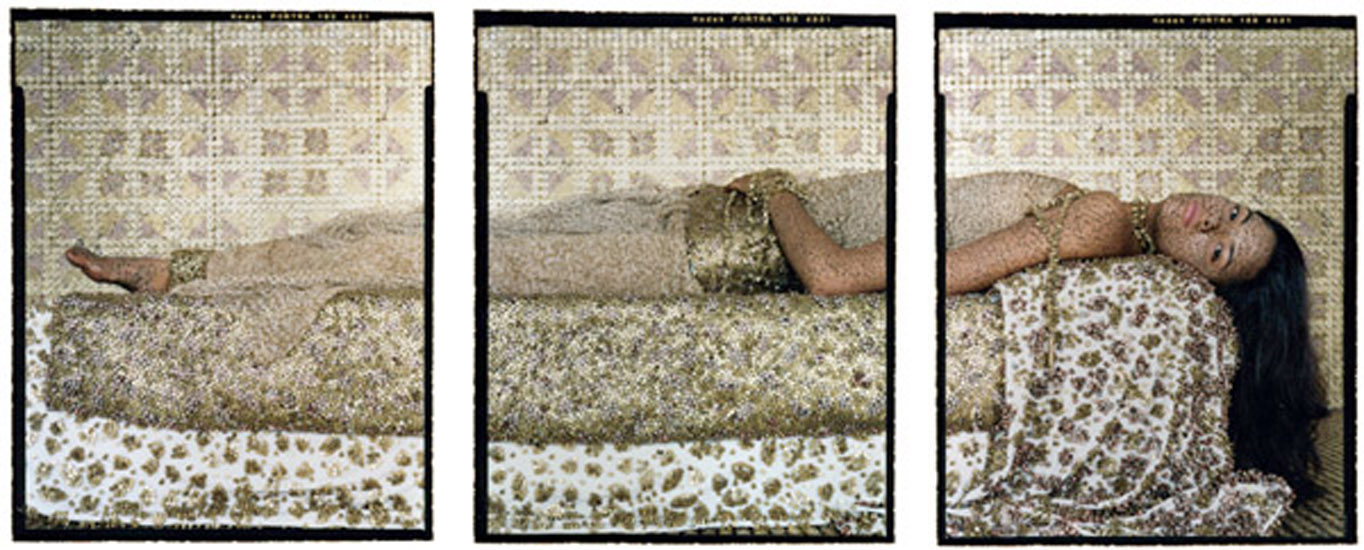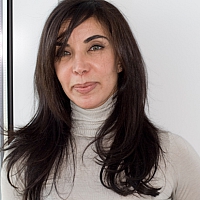
Jenkins Johnson Gallery 521 West 26 St 5th floor NY 10001 New York États-Unis
Jenkins Johnson Gallery, San Francisco is pleased to announce their second exhibition of large-scale photographs by internationally acclaimed photographer, Lalla Essaydi, featuring the artist’s most recent series, Harem Revisited and Bullets Revisited. Essaydi recently exhibited at Museum of Fine Arts, Boston, and at the Baku Museum of Modern Art, Azerbaijan. During New Beauty, Essaydi will be featured in FotoFest 2014 Biennial in Houston, TX. New Beauty will be on view from February 6 through March, 29, 2014 with an opening reception on Thursday, February 6 from 5:30 – 7:30pm.
New York-based Essaydi, who was educated in Boston and Paris, grew up in Morocco then spent a substantial period in Saudi Arabia. These experiences with traditional Islamic life are fundamental to her unique approach of examining the identity of Muslim women. Islam, resistance, and feminism permeate Essaydi’s arresting photographs that question modern day hierarchies within Eastern culture, and the voyeuristic European tradition of depicting Arab women languishing alone or in their harem. Essaydi states “my harem is based on the historical reality; rather then the artistic images of the West – an idyllic, lustful dream of sexually available women, uninhibited by the moral constraints of 19th Century Europe.” Woeful of such Western misreprsentations of the eroticized Arab female body, Essaydi evokes these 19th-century painters, such as Ingres, Delacroix, and Gérôme, by placing her models in similar classic odalisque poses, which seres to deconstruct historical and contemporary views of Arab women in Western art.
With a method she began in 2003, Essaydi covers her models, and sometimes the garmets and walls, in layers of hand-painted henna calligraphy, subverting traditional Muslim gender stereotypes through the presence of the written word. The sacred Islamic art form of calligraphy, traditionally reserved exclusively for men, is employed by Essaydi as a small act of defiance against a culture in which women are relegated to the private sphere. Furthermore, by creating this calligraphy with henna, an art traditionally employed by women for women, Essaydi fully reclaims the female voice. The performance of creating and the resulting stunningly beautiful yet mysterious photographs allows Essaydi to traverse boundaries between East and West, male and female, past and present.
While Essaydi’s new work continues to explore themes also addressed in her earlier series, the subjects of Harem Revisited are now clothed in elaborate caftans; their surroundings covered with richly adorned fabrics turning these women into objects of decoration; props amidst an embellished environment. Loaned to Essaydi from the Nour and Boubker Temli collection, these lavish textiles were created between the 17th century and the early 20th century for use in wedding ceremonies to decorate palaces and harems, further enriching Essaydi’s interpretation of gendered practices from the past.
Bullets Revisited is a haunting and visually arresting body of work created as a response to the 2011 regional revolutions. In this series, models lay on glittering beds, in front of gold mosaics, and covered in shining clothing and jewelry which upon closer inspection is realized to be bullet casings. A domestic scene, converts into a psychological one, reflecting on violence in contemporary society. “During the time of the Arab Spring, at the beginning, I was so enchanted how women were at the forefront of everything. And then once the [new] governments were in place, the first rule they want is to put women back again….My response to it is to use something that is so beautiful but when you think about it is really significant of violence, and violence on women to protect the domestic space.”
Johnetta Betsch Cole, director of the National Museum of African Art, which featured Essaydi in a solo retrospective earlier in 2013, says, “Essaydi has used multiple artistic media to take on a central challenge: confronting deeply entrenched historical notions about femininity and womanhood… Her work is vital and offers a fresh new voice and needed insight as it challenges the stereotype and perception of Arab, African, and female identity.”
Essaydi is in the permanent collections of Louvre Museum, Paris; Los Angeles County Museum of Art; Museum of Fine Arts, Houston; Museum of Fine Arts, Boston; The Art Institute of Chicago; San Francisco Museum of Modern Art; Smithsonian Museum of African Arts, Washington D.C.; the Arab Museum of Modern Art, Qatar, amongst others.

